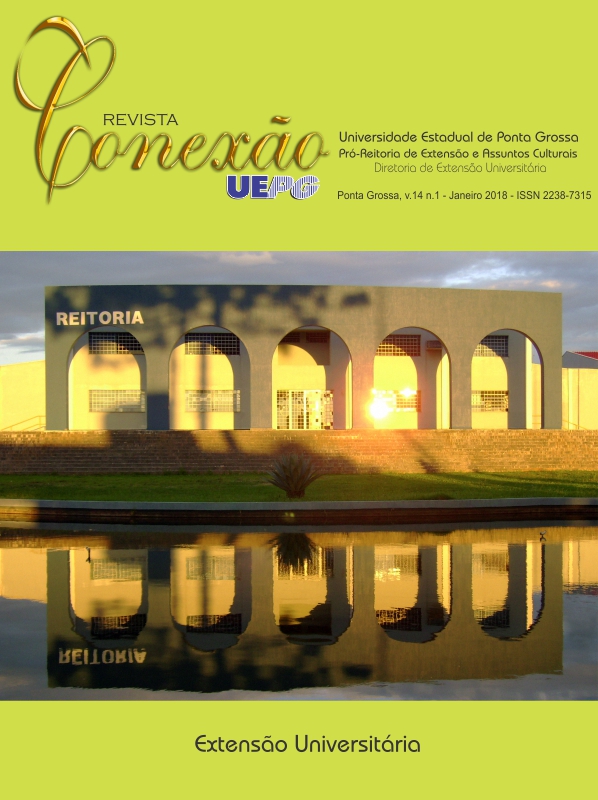TALENTOS DO INSTITUTO FEDERAL DO PARANÁ: APRENDER A FAZER E A SER EM ESPANHOL E INGLÊS
DOI :
https://doi.org/10.5212/Rev.Conexao.v.14.i1.0012Mots-clés :
línguas adicionais, música, inclusão social.Résumé
O projeto de extensão Talentos do Instituto Federal do Paraná (IFPR), conectado ao projeto Vamos Cantar uma canção?, do Programa de Bolsas Acadêmicas de Inclusão Social, estimula a interação com as línguas Espanhola e Inglesa através de músicas. O objetivo é ampliar o contato, participação, aprendizagem e possibilidades de identidade. Na execução, os estudantes são selecionados em apresentações de música em sala e preparados para cantar na Mostra de Cursos, quando o Instituto abre suas portas para a comunidade externa. Neste relato, além das impressões dos coordenadores, são apresentados depoimentos dos participantes, coletados por meio de questionário. Para os estudantes, essa experiência foi uma superação que os projetou como sujeitos capazes de fazer e de ser em Espanhol e Inglês. Cantar movimentou suas identidades da descrença à crença, ampliou possibilidades de inclusão para que eles se posicionassem como parte e não à parte dessas línguas.
Téléchargements
Références
FREIRE, Paulo. Pedagogia da Autonomia. São Paulo: Paz e Terra, 1997.
LIMA, Diógenes C. de Lima (Org.). Inglês em escolas públicas não funciona: uma questão, múltiplos olhares. São Paulo: Parábola Editorial, 2011.
NORTON, Bonny. Non-participation, imagined communities and the language classroom. In: BREEN, Michael P. (Ed.). Learner contributions to language learning: new directions in research. Harlow, England: Pearson Education, 2001. p. 159-171.
______. Language and identity. In: HORNBERGER, Nancy H.; MCKAY, Sandra Lee. (Ed.). Sociolinguistics and language education. Bristol, UK: Multilingual Matters, 2010, p. 349-369.
NORTON, Bonny; MCKINNEY, Carolyn. Identity and second language acquisition. In: ATKINSON, Dwight. (Ed.). Alternative approaches to Second Language Acquisition. New York: Routledge, 2011, p. 73-94.
NORTON, Bonny; TOOHEY, Kelleen. Identity, language learning, and social change. Language Teaching, v. 44, n. 4, p. 412-446, 2011.
PAIVA, Vera Lúcia Menezes de Oliveira. O outro na aprendizagem de línguas. Disponível em: <http://www.veramenezes.com/ outro.pdf>. Acesso em: 03 mar. 2012.
PAVLENKO, Aneta. Gender and sexuality in foreign and second language education: critical and feminist approaches. In: NORTON, Bonny; TOOHEY, Kelleen. (Ed.). Critical pedagogies and language learning. Cambridge: Cambridge University Press, 2004. p. 53-71.
SILVA, Tomaz T. da. A produção social da identidade e da diferença. In: ______. (Org.). Identidade e diferença: a perspectiva dos Estudos Culturais. Petrópolis: Vozes, 2012. p. 73-102.
Téléchargements
Publié-e
Numéro
Rubrique
Licence
a) Os autores mantêm os direitos autorais e concedem à revista o direito de primeira publicação, com o trabalho simultaneamente licenciado sob a Creative Commons Attribution License que permite o compartilhamento do trabalho com reconhecimento da sua autoria e publicação inicial nesta revista.
b) Ao submeter um artigo à Revista Conexão UEPG e tê-lo aprovado os autores concordam em ceder, sem remuneração, os seguintes direitos à Revista: os direitos de primeira publicação e a permissão para que a Revista redistribua esse artigo e seus metadados aos serviços de indexação e referência que seus editores julguem apropriados.
c) Os leitores são livres para transferir, imprimir e utilizar os artigos publicados na Revista, desde que haja sempre menção explícita ao(s) autor (es) e à Revista Conexão UEPG e que não haja qualquer alteração no trabalho original. Qualquer outro uso dos textos precisa ser aprovado pelo(s) autor (es) e pela Revista.

Este obra está licenciado com uma Licença Creative Commons Atribuição 4.0 Internacional.





